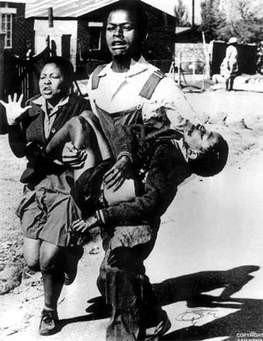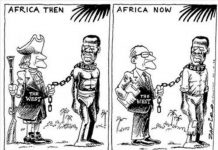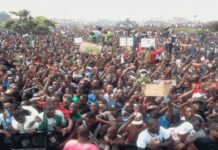 On June 16, 1976 Hastings Ndlovu, Hector Pieterson and twenty one other children were mowed down by the hate-filled bullets of the apartheid state machine, in the South Western Township (Soweto) of Orlando. Their crime was refusing to be taught with what Desmond Tutu described as “the oppressors’ language” in line with the Afrikaans Medium Decree of 1974. Over 500 persons were shot dead or never to be seen again from the violence that rocked the apartheid enclave for days after this. It was actually the beginning of the end of the apartheid regime as within and outside the country the visible “fire in Soweto, burning all my people” (as Okosun rightly sang) became a clarion for action. As the fortieth anniversary of this bloody chapter of heroic rebellion is being marked, South Africa, is again at “a delicate time in a dangerous year, societally”, to borrow the words of Jeremy Gauntlett, the highest paid lawyer in the country, who was hired by Jacob Zuma to defend him on the Nkandla fraud, to no avail. There are lessons to be drawn for this moment, by casting our minds back, in looking forward.
On June 16, 1976 Hastings Ndlovu, Hector Pieterson and twenty one other children were mowed down by the hate-filled bullets of the apartheid state machine, in the South Western Township (Soweto) of Orlando. Their crime was refusing to be taught with what Desmond Tutu described as “the oppressors’ language” in line with the Afrikaans Medium Decree of 1974. Over 500 persons were shot dead or never to be seen again from the violence that rocked the apartheid enclave for days after this. It was actually the beginning of the end of the apartheid regime as within and outside the country the visible “fire in Soweto, burning all my people” (as Okosun rightly sang) became a clarion for action. As the fortieth anniversary of this bloody chapter of heroic rebellion is being marked, South Africa, is again at “a delicate time in a dangerous year, societally”, to borrow the words of Jeremy Gauntlett, the highest paid lawyer in the country, who was hired by Jacob Zuma to defend him on the Nkandla fraud, to no avail. There are lessons to be drawn for this moment, by casting our minds back, in looking forward.
Almost 20,000 students marched from their different schools, heading to the Orlando stadium in the morning of July 16, forty years back, for a protest rally against the use of Afrikaans for teaching and learning in schools. This was organised by the Soweto Students’ Representative Council’s (SSRC) Action Committee, which was inspired by the Black Consciousness Movement.
They carried placards with slogans such as “Down with Afrikaans”, “Viva Azania”, “If we must do Afrikaans, Vorster must do Zuku”, as they marched. But the police blocked their routes in an attempt to stop it from holding. They were however undaunted and peaceful.
The students then headed for the Orlando High School. The police however would not let them be. They were charged with police dogs. But they killed one of the dogs. Taking this as a pretext of “unruly behaviour”, the police fired live bullets into the crowd of students, killing 23 of them.
This repressive act did not kill the spirit of revolutionary reawakening of Soweto. On the contrary, mass anger spread across South Africa and worldwide. A renewed spirit of resistance followed on the heels of condemnation of this traumatizing act.
Less than twenty years later, apartheid, formally speaking would become history. In the period between, a militant working class movement and unrepentant community activism united the resistance against apartheid. The Africa National Congress which had to a great extent been decimated within the country in the 1960s, with most of its leading cadres in exile still had the allure of its name.
The new forces arrayed around the United Democratic Front in the heady 1980s aligned themselves to this historic platform. ANC thus claimed the trophy of a post-apartheid state, resting on one hand on the confidence of working class-people and youth and on the other, negotiations with the ancient regime of apartheid. But the Soweto Uprising marked the beginning of that renewed mass movement from below that ANC rode on the crest of to power in 1994.
By 2012 though, ANC had blood on its hands. 34 striking miners were killed at Marikana by a ruling party that claimed to be a (former) liberation movement. Worse still, the Congress of South African Trade Unions (COSATU) had gotten so deep in bed with the ANC that it could at best describe the Marikana massacre as a mere “tragedy”.
And even the South African Communist Party (SACP) whose General Secretary Blade Nzimande had its constitution reformulated so he could hold on to that post and also (like many SACP and former COSATU leaders) be a minister in government have seen nothing, heard nothing and done nothing regarding every bungling step of the ANC and President Jacob Zuma, from Marikana to the recent shame of Nkandla.
The spirit of Soweto is however being rekindled. It is being rekindled in the avalanche of service delivery protests. The united front and movement for socialism which are tentative steps in the pathway to building a new force, a mass movement from below, that, can buoy a party to challenge the fractured hegemony of the ANC and win the battle for system change in South Africa fan the embers of a renewed moment akin to that of the fires that blazed the trail from Soweto to the end of formal apartheid.
In this lies the hope for cleansing the continued traumatisation of the working class-people in a country rich with history of struggle, but betrayed by the very ones trusted to carry forth the torch of bringing to birth a new South Africa from the ashes of the old.
by Baba Aye









